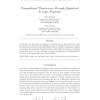1020 search results - page 37 / 204 » Tight Semantics for Logic Programs |
115
Voted
OWLED
2007
15 years 4 months ago
2007
The use of background knowledge and the adoption of Horn clausal logic as a knowledge representation and reasoning framework are the distinguishing features of Inductive Logic Prog...
116
click to vote
CORR
2007
Springer
15 years 2 months ago
2007
Springer
In this paper we show that an arbitrary propositional theory, when interpreted under the answer sets semantics (called Equilibrium Logic for this general syntax), can always be re...
149
Voted
AMAI
2008
Springer
15 years 2 months ago
2008
Springer
We introduce a knowledge representation language AC(C) extending the syntax and semantics of ASP and CR-Prolog, give some examples of its use, and present an algorithm, ACsolver, ...
142
Voted
CORR
2011
Springer
14 years 9 months ago
2011
Springer
Nonmonotonic causal logic, introduced by Norman McCain and Hudson Turner, became a basis for the semantics of several expressive action languages. McCain’s embedding of definit...
143
Voted
LPNMR
2004
Springer
15 years 8 months ago
2004
Springer
Abstract. Many NP-complete problems can be encoded in the answer set semantics of logic programs in a very concise way, where the encoding reflects the typical “guess and check�...

